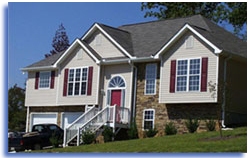
|
Dampwood TermitesIn the United States, the true dampwood termites of the family Hodotermitidae are represented principally by two species: the Pacific dampwood termite (Zootermopsis angusticollis) and the Nevada (also called the small) dampwood termite (Zootermopsis nevadensis}. Both of these species are found in the western United States, primarily in the Pacific states. A third species, Zootermopsis laticeps, occurs in parts of Arizona and New Mexico, but little is known of its biology. In terms of physical size, however, Z. laticeps is the largest species. In general, Z. angusticollis is replaced by Z. nevadensis in the higher elevations and in slightly drier locations. Several other species of what are commonly called dampwood termites not belonging to the family Hodotermitidae are also present in the United States, but will not be discussed here. As the name implies, dampwood termites require a great deal of moisture. They are commonly found in logs associated with water sources and in saturated or decaying wood. Dampwood termites do not require contact with the soil, but termites and subsequent damage can be very great at any wood-earth contact, as contact may be conducive to high wood moisture contents. Dampwood termites have been recorded attacking such things as homes, decks, power poles, railroad ties, docks and bridges.
Dampwood termites are social insects, meaning there are different forms to carry out specific duties within the termite colony. There are several types of reproductive forms, as well as a soldier form for colony protection from various threats. Reproductives and soldiers are the mature form of the termites, while the remainder of the colony is comprised of immature nymphs whose function appears to be food gathering, nest maintenance and brood care. Swarming (where winged reproductives, or alates, take flight and ultimately mate to found new colonies) may occur at any time of the year, but it seems to take place most commonly in the late summer to middle fall. Swarms often occur in the late afternoon or early evening, and are common after rainstorms. Dampwood termites are best identified by the winged reproductives and the soldiers. Soldiers are large and robust, and may be up to 3/4-inch in length. The head is large and dark, while the remainder of the body is lighter and almost creamy in color. The soldier's mandibles are quite large, and have an unequal number of teeth on each pair. The antennae usually have more than 22 segments. The winged reproductive forms are approximately one inch in length. The body of the reproductive is a coppery brown, and the wings are a darker shade of brown. The wings of the reproductives have three or more heavily defined veins in the forward area of the wing, and the antennae will usually have more than 22 segments. The wings of the reproductives are shed soon after mating. Treatment Methods Although dampwood termites are not generally considered to be pests of tremendous economic importance, they can cause severe damage in some locales because of their propensity to involve more of the structure than subterranean termites might. The best method for control of these pests is prevention and sanitation. All attempts should be made at removing infested wood and drying out wood to be protected. Correct faulty grades involving moist earth, and try to limit water sources that may provide conditions conducive to dampwood termites. These techniques may also prevent rot. Chemical control techniques can be also used, and drill-and-treat methods as well as soil application with registered termiticides have shown to be effective. Fumigation is generally not used for dampwood termite control.
|
|
| Welcome | Termites | General Pest | Treatments | Guarantee | Contact Us | Site Map |
Copyright 2009 Buy-Rite Termite & Pest Control | 888-575-2782 |
||||||



